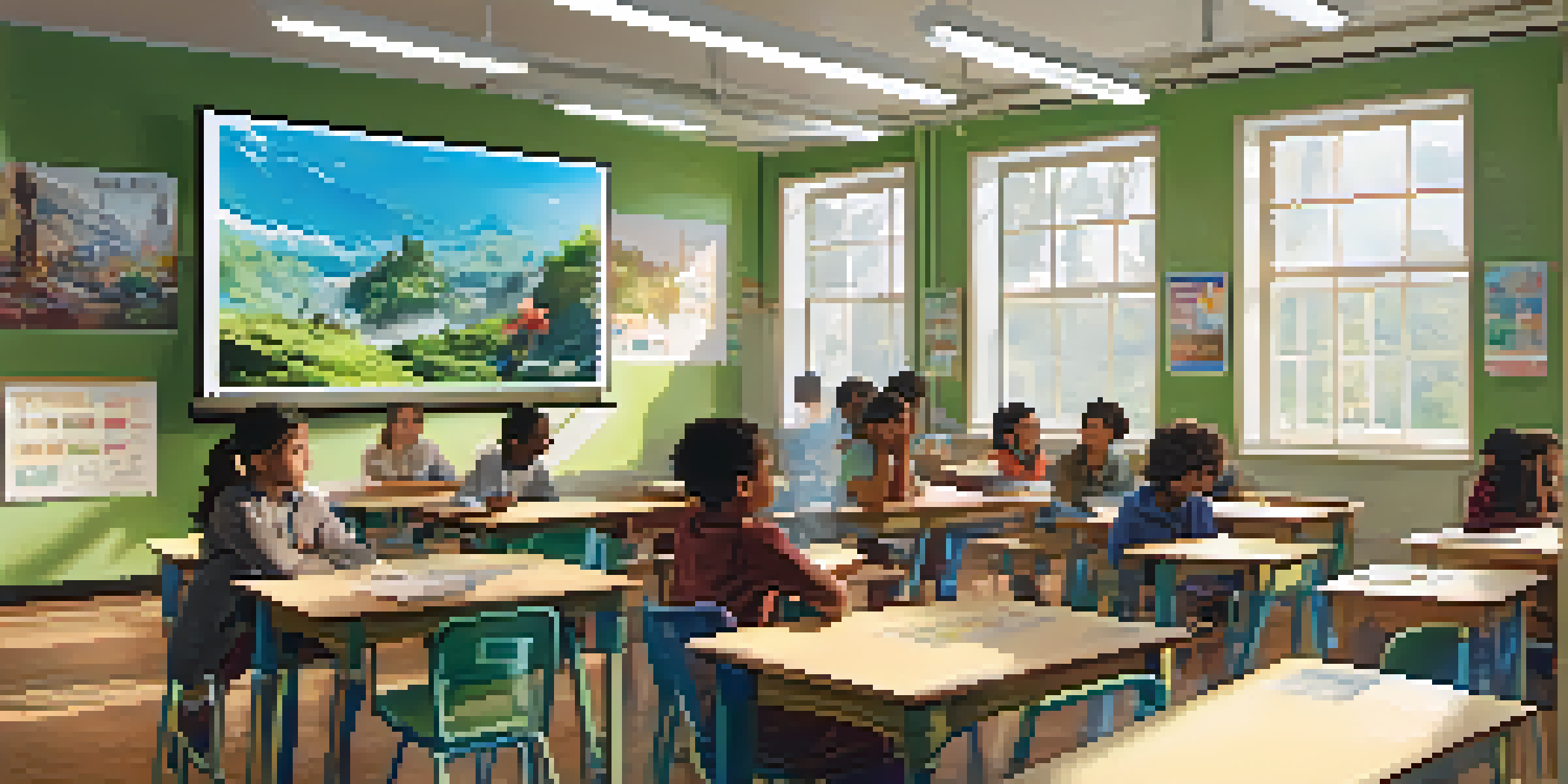Documentaries as Tools for Education and Enlightenment

Understanding Documentaries and Their Impact
Documentaries are non-fiction films that explore real-life events, people, and issues. They aim to inform and educate the audience, often using a narrative style to present facts in an engaging way. This combination of storytelling and factual reporting can make complex subjects more accessible and relatable.
Documentaries are a powerful way to change perspectives and ignite discussions about critical issues.
The impact of documentaries can be profound, as they not only entertain but also provoke thought and discussion. For example, a documentary about climate change can inspire viewers to take action and make informed decisions regarding their environmental footprint. By presenting real-life stories and evidence, documentaries can change perceptions and drive social change.
Moreover, documentaries often highlight underrepresented voices and issues, providing a platform for awareness and understanding. This aspect is crucial in fostering empathy among viewers, as they can connect emotionally with the subjects being explored. In essence, documentaries serve as a bridge between education and enlightenment.
The Role of Documentaries in Education
Documentaries play a pivotal role in education by supplementing traditional learning methods. They provide visual and auditory stimuli that can enhance comprehension and retention of information. For instance, a documentary on ancient civilizations can bring history to life, allowing students to visualize and engage with the material more deeply.

In classrooms, educators can use documentaries to spark discussions and critical thinking. After watching a film, students can analyze and debate the themes, encouraging them to form their own opinions and perspectives. This interactive approach to learning promotes a more enriched educational experience.
Documentaries Inspire Social Change
Through compelling storytelling, documentaries raise awareness and motivate viewers to take action on pressing social issues.
Furthermore, documentaries can cater to diverse learning styles. Visual learners may benefit from the imagery and cinematography, while auditory learners can grasp concepts through narration and dialogue. This versatility makes documentaries a valuable resource in educational settings.
Documentaries as Catalysts for Change
Many documentaries aim to raise awareness about pressing social issues, acting as catalysts for change. Films like 'Blackfish' and 'The Social Dilemma' have sparked global conversations about animal rights and digital privacy, respectively. Through compelling storytelling, they encourage viewers to reflect on their own values and actions.
The best way to predict the future is to create it, and documentaries can inspire us to take action towards that future.
The emotional connection that documentaries create can motivate individuals to get involved in advocacy or community service. For instance, after watching a documentary on poverty, viewers might feel compelled to volunteer or donate to related causes. This ripple effect demonstrates the power of documentaries to inspire action.
Moreover, documentaries often collaborate with activists and organizations, amplifying their messages and efforts. This partnership not only lends credibility to the films but also provides resources for viewers to engage further. By educating audiences on important issues, documentaries can lead to meaningful societal shifts.
The Accessibility of Documentaries
One of the remarkable aspects of documentaries is their accessibility. With the rise of streaming platforms like Netflix and YouTube, documentaries are now available to a global audience. This democratization of information allows individuals from various backgrounds to access educational content easily.
Additionally, many documentaries are available for free, making them an invaluable resource for those who may not have access to traditional educational materials. Libraries and educational institutions often provide free screenings, further promoting accessibility. This ensures that knowledge can reach those who need it most.
Educational Value of Documentaries
Documentaries enhance learning by providing visual and auditory stimuli, making complex subjects more relatable and engaging.
The availability of subtitles and translations also broadens the audience for documentaries, allowing non-native speakers to engage with the content. This inclusivity fosters a greater understanding of global issues, bridging cultural gaps and encouraging dialogue among diverse communities.
The Power of Storytelling in Documentaries
At the heart of every documentary is storytelling, a powerful tool that captivates audiences. By weaving together personal narratives with factual information, filmmakers can create an emotional connection that resonates with viewers. This storytelling approach makes complex topics more relatable and easier to digest.
For example, a documentary about the refugee crisis may share individual stories of families fleeing war zones. These personal accounts can humanize the statistics, prompting viewers to empathize with the struggles faced by others. Such narratives can be more impactful than mere data, driving home the urgency of the issues at hand.
Ultimately, effective storytelling in documentaries can leave a lasting impression on viewers. It encourages them to not only learn but also act upon the knowledge gained. This combination of education and emotion is what makes documentaries such powerful tools for enlightenment.
Engaging with Documentaries Beyond Viewing
Watching documentaries is just the first step; engaging with the content can deepen understanding and inspire action. Viewers can participate in discussions, workshops, or online forums to share their thoughts and insights. This collaborative approach fosters a community of learners who can share diverse perspectives.
Additionally, many documentaries provide resources for further exploration, such as recommended readings, websites, or organizations related to the topic. This encourages viewers to continue their education and engage with issues that matter to them. By taking the initiative to learn more, individuals can become informed advocates.
Accessibility of Documentaries
The rise of streaming platforms has made documentaries widely accessible, allowing diverse audiences to engage with important global issues.
Furthermore, social media platforms allow viewers to share their favorite documentaries and discuss their impact. This sharing creates a ripple effect, encouraging others to watch and engage with the content. In this way, documentaries can spark a broader movement of awareness and action.
The Future of Documentaries in Education
As technology continues to evolve, the future of documentaries in education looks promising. Virtual reality (VR) and interactive documentaries are emerging trends that can enhance the learning experience. These innovative formats allow viewers to immerse themselves in the subject matter, making learning even more engaging.
Additionally, educational institutions are increasingly incorporating documentaries into their curricula. This shift reflects a growing recognition of the value of visual storytelling in conveying complex ideas. As educators embrace these tools, students are likely to benefit from a more diverse and enriching educational experience.

Moreover, with the rise of independent filmmakers and platforms dedicated to educational content, we can expect a broader range of topics and perspectives. This diversity will enhance the educational landscape, allowing for a richer understanding of global issues. The future of documentaries as tools for education and enlightenment is bright, filled with potential for change.